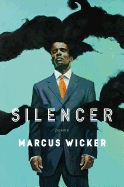
Ruth Lilly Fellow and Pushcart Prize-winning poet Marcus Wicker (Maybe the Saddest Thing) is influenced by the hip-hop of Kendrick Lamar, A Tribe Called Quest and DC's MC Oddisee. Their sounds and rhythms kick along beneath the poems in Silencer, underscoring the collection's broad look at the continuing challenges of being a black man in the United States. He muses on life in academia: "Pretend/ as if I'm one of the gang, given over to rigorously lazy readings/ of Foucault, Foster Wallace." And on Midwest suburbia: "chemical lawns, tender-/ skinned children, its Uzi sprinkler heads...? Flame Buicks & midlife crisis sports bikes." But Wicker can't escape race and racism, and he finds trouble on the Internet: "an endless intangible/ stumbling ground of false deities,/ dogma & loneliness, sad as a pile of shit/ in a world without flies."
If these poems are often cool and conversational, they are also combative and political. In one of the strongest, "Watch Us Elocute," the narrator notes: "yesterday,/ some simple American citizen--throwback/ supremacist Straight Outta Birmingham, 1963--/ aimed his .45 & emptied the life from nine/ black believers at an AME church in Charleston." His lines bear a disciplined cadence and form, and the hip-hop influence drives Silencer's startling and unsettling power. Wicker covers it all in the conclusion to the bling poem "Blue Faces, after Kendrick Lamar": "Cashier holding my twenty up to the light to see if it's real money. Like I'd be shopping at Wal-Mart if I could counterfeit money." These are in-your-face poems that also make you want to bounce. --Bruce Jacobs, founding partner, Watermark Books & Cafe, Wichita, Kan.

